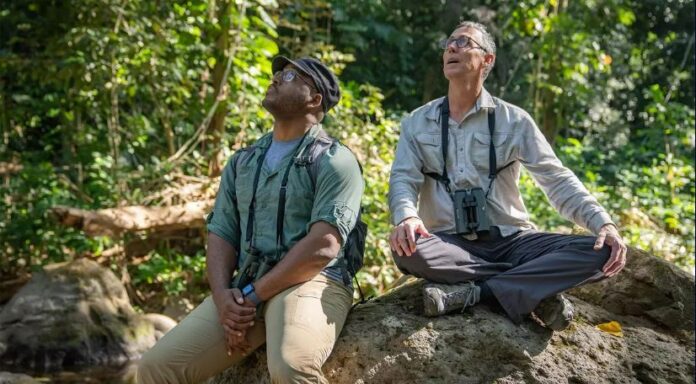( ENSPIRE Entertainment ) Airing August 9th, the Final Episode of the Series Explores Black History Through the Science of Cotton
ENSPIRE Contributor: Cailin Tennis
On Wednesday, 7/5, PBS premiered HUMAN FOOTPRINT, a new six-part science documentary. This part-science, part-travel series takes viewers on a journey around the world to explore the ways humans are transforming the planet – and what those transformations tell us about who we are as a species. Evolutionary biologist and Princeton University professor Shane Campbell-Staton, Ph.D. will host it. Each episode of HUMAN FOOTPRINT is built on a foundation of science, but the biggest lessons are about human nature, Black history, and environmental justice.
The final episode of the series, airing on August 9th, is interesting and culturally relevant. Entitled “The Ground Below,” this powerful episode explores the science and history behind cotton, which has had an incredible impact on American culture. The episode examines how a prehistoric coastline from North Carolina to Texas laid the foundation for a crop that re-shaped Black American history, the collective American culture, and even our DNA.

“The Ground Below” features interviews with various experts to tell us more about Black history through the lens of farming cotton. First, Julius Tillery makes an appearance. He is the founder of BlackCotton, a business that aims to uplift the Black community closest to the cotton fields in Northampton County, NC by creating home decor, jewelry, and accessories handmade with cotton cultivated from Julius’s farm. Tillery is a high school math teacher and fifth-generation cotton farmer.
Second is Steven Micheletti, a scientist at 23AndMe who speaks about how researchers can use DNA to study human migrations like the forced migration of the African slave trade related to the cotton industry. After hearing about the science of cotton, two key speakers tell audiences how it connects to Black history, as well as Black culture and advocacy today. Civil rights attorney and activist Faya Rose Touré and legendary hip-hop/jazz producer Adrian Younge partner up in the final minutes of the show. They speak about how this history connects more broadly to the civil rights movement and the development and growth of African American music and culture in the 20th century.
This docuseries is at its core addressing relevant, difficult problems of our world. Most notably that the Black struggle for equality has persisted throughout the years of American history. Apart from this episode, the series takes viewers from high-tech labs to sweltering street markets, from farms to restaurants, and from primeval forests to the back alleys of New York. The show is not a “doom and gloom” tale of human villainy. Instead, it is an honest reckoning with our vast footprint and our species’ singular history of transforming the planet.
In 4.5 billion years, the planet has never experienced anything like humans; we are no ordinary organism. Experience how Shane Campbell-Staton, Ph.D. leads us through the immense complexities of human existence and impact by catching the premiere of the show. It will premiere Wednesday, July 5 at 9 p.m. ET (check local listings) on PBS, PBS.org, and the PBS App. You can also watch a preview clip of “The Ground Below” episode (premiering August 9th) here.
Related Articles: “Birthing Justice” Airs on PBS During Black Maternal Health Week in April, “Making Black America: Through the Grapevine” Episode Two Premiered on PBS







